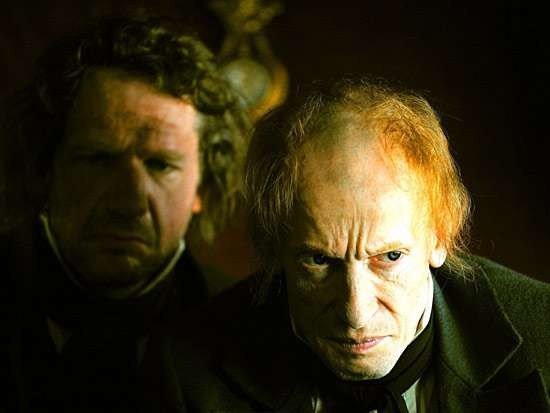-
Aleksandr Sokurov: Faust (2011)--FCS
ALEKSANDR SOKUROV: FAUST (2011)--FCS

JOHANNES ZEILER AND ANTON ADASINSKY IN FAUST
Sokurov's very strange and visually remarkable version of 'Faust'
Aleksandr Sokurov's Faust won the top prize, the Golden Lion, at the Venice Film Festival in September 2011. Gavin Smith, the editor of Film Comment, introduced the FCS series and this film at the Lincoln Center Walter Reade Theater by saying that this was probably the only chance audience members would get to see it on the big screen. Indeed other than his big US art house success, the tour-do-force one-long-take trip through a museum with music conducted by Valery Gergiev film Russian Ark, Sokurov's films have rarely gotten theatrical releases Stateside. And Faust is not a likely candidate. The grubby opening sequence included hoisting up a naked cadaver whose guts fell out, which sent half a dozen people from the theater. When giving the Golden Lion, Darren Arronovsky announced that it was the kind of film that could change your life forever. Sokurov's films are remarkable as they are off-putting and strange. Most are haunting and hypnotic. Alexandra, (NYFF 2007)about an old woman who visits her soldier son at the front, is moving. The Sun (NYFF 2005), an incredibly sensitive portrait of the Emperor Hirohito in the time up to and after the Japanese surrender, is a hypnotic, revealing, and extraordinary touching portrait. Father and Son is as sensuous and homoerotic and strangely beautiful as any film about men ever made. Like many of Sokurov's films it exists in a foggy hyperreal dreamworld that is complete but only partly parallel to our own.
Faust, which like Sokurov's Moloch, is in German, announces in its opening titles that it is based on the work by Johann Wolfgang von Goethe, but interprets the legend of the man who trades his soul to the devil to gain knowledge in a very peculiar manner. This Heinrich Faust (Johannes Zeiler), who follows the traditional pattern in being a learned scientist, is linked up with a strangely annoying and grinning busybody of a devil with a pear-shaped body and scraggly reddish hair. He is a moneylender (Anton Adasinsky). Faust has become attracted to Margarete (Russian actress Isolda Dychauk), a pure young woman with pale skin and flaxen reddish hair, and it seems that his bargain is to give up his soul for a little time spent with her. Some "Faustian bargain."
The mood of Sokurov's Faust, as Variety reviewer Jay Weissberg has emphatically noted, is different from most of his other films in its ceaseless nattering verbosity. Mostly Sokurov's mood- and image-centric films contain few words but this one never stops talking. What with its voiceover from Faust or conversation between him and the moneylender, or the rambles of the moneylender, the soundtrack here keeps a constant chattering rhythm going like an outboard motor continually running. Sokurov thus creates and maintains a kind of peculiar energy and a sense of a world that is going on just beyond us, inside the screen so to speak. Sokurov has done this before, but this time the sense of a world that we can't quite penetrate is a little different. In other films we feel swept away (Russian Ark) or enveloped and hypnotized (Father and Son, The Sun). Here we are more alienated.
He counts this as the last in his tetrology about the corrupting effects of power. Those that I have seen (I'm missing Taurus, about Lenin) have little in common with each other. Moloch (1999) deals with Hitler in 1942, in Bavaria, and focuses on a visit to Eva Braun by Hitler, Goebbels, Goebbels' wife and Martin Bormann in which they sit around for several days talking about politics. The Sun, as mentioned, is an intimate portrait of the Emperor Hirohito.
What distinguishes Faust, which seems otherwise one of Sokurov's brilliant misfires, are the images and the mise-en-scène. Weissberg comments that the photography echoes Flemish painting and also folk art about witches. This may be so, but what seems even more striking is the way the director has recreated the look and feel of early photography. One could also not help but be reminded in the early sequence of Faust's laboratory of the photographs of Joel-Peter Witkin. And this gives a sense of how rich and elaborately staged and photographed the interiors and exteriors are and how convincing the people and costumes are in their sense of period. Beyond that, the framing of exteriors, the peculiarities of aspect ratio and focus, and the complex "gray" tonalities all build up the nineteenth-century look. Jim Jarmusch's Dead Man is an analogy, but here the effect is richer -- and stranger.
Manohla Dargis has commented on a shot as unforgettable. It's one where Faust is united with Margarete and he embraces her and they flip over together into a river. It's a dream-image, symbolic rather than real. And the whole film is best understood as what Dali and Bunuel might have done if they'd gone on working together and done their version of Faust. But there's just a gutted corpse here, no dead donkeys lying inside a grand piano. I still remember the late Graham Leggett introducing Sokurov's The Sun at a press screening for the 2005 New York Film Festival saying this was one of the world's great directors: the sheer boldness and conviction with which Leggett made the statement left a lasting impression. And somehow it still rings true.
Seen for this review as part of the Film Society of Lincoln Center's series, Film Comment Selects. Screening times:
Friday, February 17 at 8:15PM, Tuesday, February 21 at 3:15PM and Tuesday, February 28 at 9:00PM.
Last edited by Chris Knipp; 03-23-2012 at 06:01 PM.
 Posting Permissions
Posting Permissions
- You may not post new threads
- You may not post replies
- You may not post attachments
- You may not edit your posts
-
Forum Rules





 Reply With Quote
Reply With Quote
Bookmarks